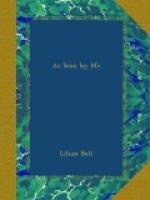He made some apologies, and gave the order at once. The baby was hauled down amid the smiles of the English passengers. But at Assiout we were avenged when an enormous American flag arrived by rail and was hoisted to the main flagstaff, twenty feet higher than the British. When I came out on deck that Sunday morning, and saw that blessed flag waving above me, everything blurred before my eyes, and I do assure you that it was the most beautiful sight I saw in all of that European continent. You may talk about your temples and your ruins and your old masters! Have you ever seen “Old Glory” flying straight out from a flagstaff in a foreign country seven thousand miles away from home?
The Nile is much broader than I expected to find it, and, like the Missouri and the Golden Horn, it is always muddy. The Mayflower carries only fifty passengers, which is of the greatest advantage for donkey-rides and for seeing the ruins, a larger party being unwieldy. She draws but two feet of water, having been built expressly for Nile service, so we had the proud satisfaction of seeing one of the big Rameses boats stuck on a sand-bank for eighteen hours, while we tooted past her blowing whistles of defiance and derision. Whenever we felt ourselves going aground on a sand-bank we just reversed the engines and backed off again, or else put on extra steam and ground our way through it. In the whole three weeks we were not aground five minutes, although we passed one wreck settling in the water, with the bedding and stores piled up on the bank, and the passengers sailing away in the swallow-winged feluccas, which had swooped down to their rescue like so many compassionate birds.
Afternoon tea on the Nile is an unforgetable function. Everybody comes on deck and sits under the awning and watches the sun go down. Each day the sunsets grow more beautiful. Each day they differ from all the rest. Such yellows and purples! Such violet shadows on the golden water! Such a marvellously sudden sinking of the sun in a crimson flame behind the flat brown hills! And then the stillness of the Nile in the opal aftermath! Those sunsets are something to carry in the memory forever and a day.
At night the sailors lower the side awnings, crawling along the railings with their naked prehensile feet. The captain, a Nubian, on a salary of eighty-five cents a day, selects a suitable spot on the bank where the boat may remain all night. Then the bow of the boat heads for the shore and digs her nose in the soft mud. The sailors pitch the stakes and mallets out on to the bank and spring ashore. Then with Arab songs which they always sing when rowing, hauling ropes, scrubbing the decks, or doing any sort of work, the stern is gradually hauled alongside the bank, and there we stay until morning in a stillness so absolute that even the cry of the jackals seems in harmony with the loneliness of it.
I dreaded the first excursion. It was to Memphis and Sakhara, eighteen miles in all, and I never had been on a donkey in my life. I am not afraid of horses, but donkeys are so much like mules. My friends encouraged me all they could. They said that I would have a donkey-boy all to myself, that the donkey never went out of a walk, and wound up by the cheerful assurance that if he did pitch me over his head I would not have far to fall.




